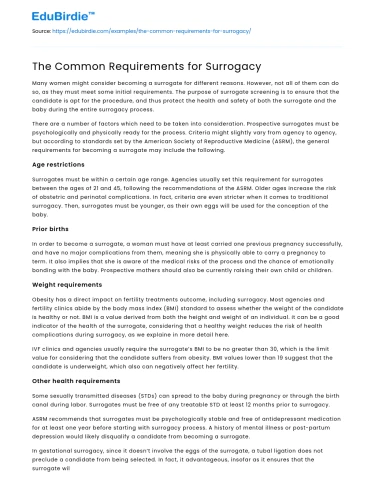Many women might consider becoming a surrogate for different reasons. However, not all of them can do so, as they must meet some initial requirements. The purpose of surrogate screening is to ensure that the candidate is apt for the procedure, and thus protect the health and safety of both the surrogate and the baby during the entire surrogacy process.
There are a number of factors which need to be taken into consideration. Prospective surrogates must be psychologically and physically ready for the process. Criteria might slightly vary from agency to agency, but according to standards set by the American Society of Reproductive Medicine (ASRM), the general requirements for becoming a surrogate may include the following.
Save your time!
We can take care of your essay
- Proper editing and formatting
- Free revision, title page, and bibliography
- Flexible prices and money-back guarantee
Age restrictions
Surrogates must be within a certain age range. Agencies usually set this requirement for surrogates between the ages of 21 and 45, following the recommendations of the ASRM. Older ages increase the risk of obstetric and perinatal complications. In fact, criteria are even stricter when it comes to traditional surrogacy. Then, surrogates must be younger, as their own eggs will be used for the conception of the baby.
Prior births
In order to become a surrogate, a woman must have at least carried one previous pregnancy successfully, and have no major complications from them, meaning she is physically able to carry a pregnancy to term. It also implies that she is aware of the medical risks of the process and the chance of emotionally bonding with the baby. Prospective mothers should also be currently raising their own child or children.
Weight requirements
Obesity has a direct impact on fertility treatments outcome, including surrogacy. Most agencies and fertility clinics abide by the body mass index (BMI) standard to assess whether the weight of the candidate is healthy or not. BMI is a value derived from both the height and weight of an individual. It can be a good indicator of the health of the surrogate, considering that a healthy weight reduces the risk of health complications during surrogacy, as we explaine in more detail here.
IVF clinics and agencies usually require the surrogate’s BMI to be no greater than 30, which is the limit value for considering that the candidate suffers from obesity. BMI values lower than 19 suggest that the candidate is underweight, which also can negatively affect her fertility.
Other health requirements
Some sexually transmitted diseases (STDs) can spread to the baby during pregnancy or through the birth canal during labor. Surrogates must be free of any treatable STD at least 12 months prior to surrogacy.
ASRM recommends that surrogates must be psychologically stable and free of antidepressant medication for at least one year before starting with surrogacy process. A history of mental illness or post-partum depression would likely disqualify a candidate from becoming a surrogate.
In gestational surrogacy, since it doesn’t involve the eggs of the surrogate, a tubal ligation does not preclude a candidate from being selected. In fact, it advantageous, insofar as it ensures that the surrogate will not become pregnant with her own oocytes.
Responsible lifestyle
Ideal qualities for a surrogate mother include having a responsible behavior and lifestyle. Prospective surrogates should provide a healthy and safe environment for the child, as well as for themselves, over the course of the surrogacy. They must therefore be non-smokers. Smoking during pregnancy increases the risk of obstetric and perinatal complications, such as miscarriage, premature birth, low birth weight or Sudden Infant Death Syndrome, so this requirement is essential.
In addition, surrogates must not use illegal drugs or abuse alcohol throughout the period of conception and pregnancy. Besides, prospective surrogates must have no history of criminal activities or felony convictions.
Financial stability
Surrogates must be financially stable, and not on governmental assistance programs. This requirement seeks to ensure that candidates are not coerced by the financial gain of the process.
Surrogacy is complex and it requires candidates to undergo multiple evaluations. This process can sometimes seem lengthy and tedious, but it is crucial in order to ensure the protection of all parties involved and, ultimately, the success of the technique.






 Stuck on your essay?
Stuck on your essay?

